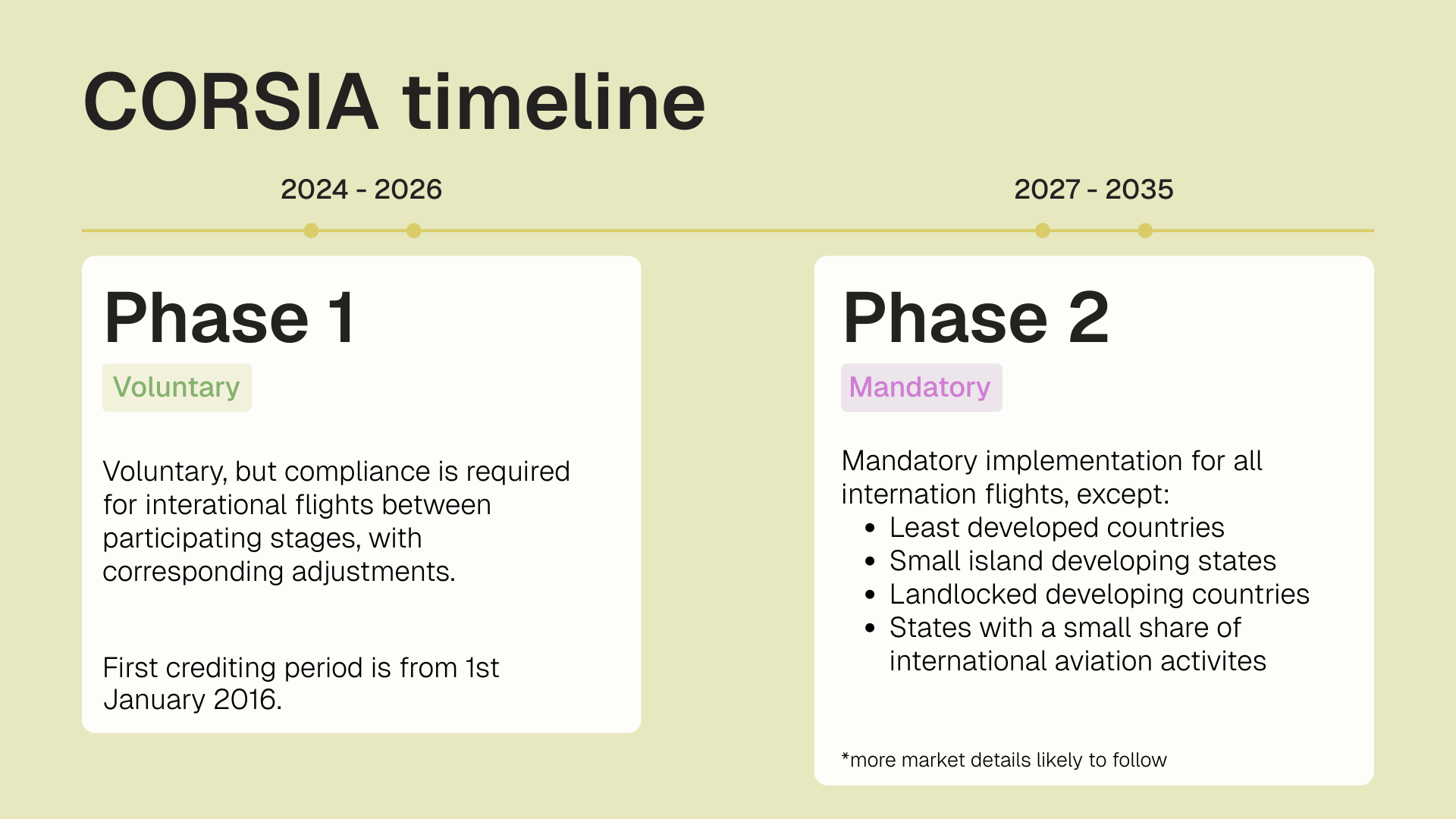What is CORSIA?
CORSIA by ICAO
Carbon Offsetting and Reduction Scheme for International Aviation (CORSIA) is an initiative developed by the International Civil Aviation Organization (ICAO) to reduce carbon emissions in international aviation.
CORSIA represents a significant step towards sustainable aviation by integrating emissions reductions into its operational framework, requiring airlines to purchase carbon credits for their emissions above a certain baseline.
The baseline for CORSIA is set as the average carbon emissions from 2019 and 2020. However, due to the significant drop in air traffic caused by the COVID-19 pandemic, only 2019 emissions data was used during the Pilot Phase (2021–2023). The scheme then transitions into Phase I (2024–2026) and Phase II (2027–2035), with the shift from voluntary to mandatory participation beginning in Phase II.

How does the CORSIA certification work?
A crucial component of CORSIA is its monitoring, reporting, and verification (MRV) framework, which is designed to maintain credibility and ensure fair participation. While participation in CORSIA remains voluntary until 2027, airlines that join the scheme must comply with ICAO regulations, effectively making it a binding compliance system.
CORSIA eligible emissions units
After establishing an airline’s emission baseline levels, participants in CORSIA are required to purchase carbon credits, known as CORSIA Eligible Emissions Units (EEUs), equivalent to any emissions exceeding their baseline. EEUs are standardised by a Technical Advisory Board and must represent carbon removal, reductions, or avoidance.
CORSIA’s industry and market impact
As airline passenger traffic returns to pre-pandemic levels and is expected to double in the next 15 years, the industry faces growing pressure to manage its carbon emissions effectively.
The potential impact of CORSIA could be significant, with projections suggesting that it may mitigate approximately 2.5 billion tonnes of carbon dioxide between 2021 and 2035. This translates to an average reduction of 164 million tonnes per year, a figure comparable to nearly 50% of all carbon credits issued, or 100% of all carbon credits retired, in 2023 alone.
Letters of Authorization (LoA) and corresponding adjustments
In the context of CORSIA, Letters of Authorization (LoA) and corresponding adjustments maintain the transparency and integrity of the emissions reduction process. An LoA is a document issued by a country or jurisdiction that allows an airline or aviation operator to use carbon credits from a specific program or registry. This confirms that the emissions reductions from projects like renewable energy or reforestation are valid for CORSIA compliance. Airlines must obtain LoAs to verify that the credits they use meet the necessary standards.
Corresponding adjustments are made when an aviation operator uses these carbon credits. To avoid double counting, the host country where the credit-generating project is based must adjust its national greenhouse gas inventory. This ensures that the emission reductions are not counted toward both the country’s national climate goals and the airline’s requirements under CORSIA.
How can businesses prepare for CORSIA?
CORSIA-compliant EEUs are not limited to airlines; any organisation can use them to meet voluntary climate commitments. Their high-quality standards make them an attractive option for a wide range of buyers.
However, it takes time for eligible projects to become operational and generate credits, increasing the risk of a supply shortage as air travel grows and CORSIA requirements tighten. Taking early action can help businesses future-proof their strategies as voluntary and compliance markets converge and the push for a unified carbon price accelerates.
ClimatePartner offers advisory, procurement, and retirement services for carbon credits. We source credits directly from project developers, traders, and suppliers to ensure the highest quality and help your company navigate the carbon market and reach its net zero goals.